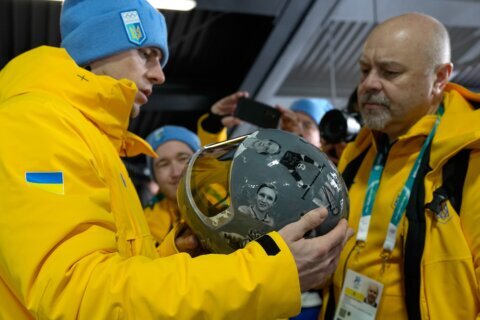CLARENCE ROY-MACAULAY
Associated Press
FREETOWN, Sierra Leone (AP) — The 7-year-old boy’s family and friends are praying over his body when the men in yellow protective suits, face shields and masks arrive. The boy had died at his home in Freetown. This same day, the collection team goes into a house for the body of another Ebola victim. Family members scream in grief as the workers put the corpse into a black body bag and carry it on a stretcher down a dirt path.
These victims, seen in video released by an international charity, died in their homes because Sierra Leone is desperately short of Ebola treatment centers more than five months after the virus came to the impoverished West African country. Of the three countries hardest hit, the epidemic is currently infecting more people in Sierra Leone.
In the past 21 days there have been 1,174 new Ebola cases in Sierra Leone, almost triple the 398 new cases in Liberia and more than quadruple the 256 new cases in Guinea, according to figures released Wednesday by the World Health Organization.
While Sierra Leone accounts for almost two-thirds of new cases, there are only an estimated 400 beds in Ebola treatment units in the whole country. The international community is slowly responding but many more lives will be lost before the level of assistance approaches the need.
“Patients are being turned away from hospitals, reducing their chance of survival and allowing the disease to spread,” said Justine Greening, Britain’s international development secretary. She spoke as the first of six treatment centers to be built by Britain was opened Wednesday outside Freetown, the capital.
The total capacity of the 80-bed facility, built of framing covered by white material, will be phased in over coming weeks. On the first day, two males and one girl, who all tested positive for Ebola, were admitted, said Helen Mayelle, a spokeswoman for Save the Children which is managing the unit in Kerry Town.
The rise of new cases in Sierra Leone is particularly startling because its population of 6 million is about half the size of Guinea’s 12 million. Liberia, with the smallest population of the three countries with 4.2 million people, has been hardest hit overall, suffering more than half the estimated 4,800 deaths in the outbreak.
Ebola, for which there is no licensed treatment, is spread through contact with bodily fluids. About 70 percent of people who get Ebola have died in this outbreak.
In September, Doctors Without Borders turned a cassava field near Bo, Sierra Leone’s second-largest city, into a tented treatment center.
Treatment centers have also been erected in hospitals and a police training school run by Sierra Leonean officials, said Dr. Sarian Kamara of the health ministry. One was just completed in Port Loko, Kamara said. That district, in the northwest, has had among the highest number of Ebola cases at 563, the National Ebola Response Center reported Thursday.
Reported cases in two districts in and around Freetown are surging with a total of 1,261.
Video provided by Concern Worldwide, an international humanitarian organization managing 10 burial teams in Freetown and its suburbs, shows the human toll. After a yellow-suited collection team left with a body, some inconsolable family members collapsed in the mud, their screams sounding throughout the tree-studded neighborhood.
Dr. Bruce Aylward, in charge of WHO’s Ebola operational response, said that until more Ebola care facilities are built, “there’s a basic standard of care which we can try to provide at the community level that will markedly improve the ability of most people to survive, or a substantial portion of people to survive.”
That involves providing a minimum amount of protective gear and teaching how to avoid getting infected, he said.
In neighboring Liberia, Doctors Without Borders has distributed more than 50,000 family protection and home disinfection kits and plans to hand out 20,000 more.
More people should have access to treatment centers, but the disinfection kits are needed for now “because of the weak international response to Ebola,” the group said. Doctors Without Borders started the campaign in Liberia when the situation was dire in its capital, said group member Sophie-Jane Madden.
USAID and UNICEF have also distributed thousands of kits in Liberia. CARE International has distributed hygiene packs to 1,100 households in Sierra Leone, including soap and buckets fitted with taps.
Justin Forsyth, CEO of Save the Children, was recently in Sierra Leone. He said he is proud that his organization has worked with British organizations and its army to build and run the new center in Kerry Town.
“But we know we need to redouble our efforts if we are to get ahead of this crisis,” he said. “We are in a life and death race against time.”
___
Selsky reported from Johannesburg. AP journalists Maria Cheng in London and Sarah DiLorenzo in Dakar, Senegal contributed to this report.
Copyright 2014 The Associated Press. All rights reserved. This material may not be published, broadcast, rewritten or redistributed.







